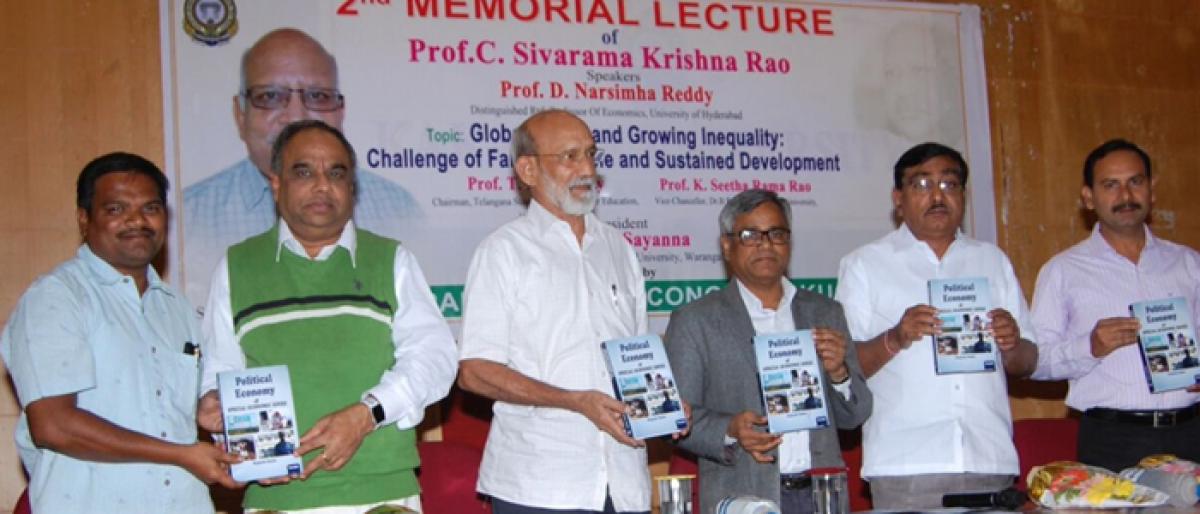Live
- Govt plans to establish offshore Johns Hopkins University Campus in India
- Goa Aces clinch Indian Racing League title
- Study finds how hormone therapy can reshape the skeleton
- High-street fashion players looking at India for manufacturing: Report
- Shreyas Iyer to lead Mumbai as Prithvi Shaw returns for Syed Mushtaq Ali Trophy
- 'Failed to resolve crisis': NPP withdraws support from BJP govt in Manipur
- Chennai: Actress Kasturi Remanded in Custody Until 29th of This Month
- Aaqib Javed likely to become Pakistan's new white-ball head coach
- BJP panel to draft poll charge sheet against AAP govt in Delhi
- Allu Arjun Thanks Fans in Patna, Teases 'Pushpa 2' Release
Just In
Globalisation causing concentration of wealth, economic disparities


In order to sustain the growth achieved in any nation, it must be just and equitable, noted a social scientist and retired professor of economics from University of Hyderabad, D Narasimha Reddy. Contrary to the above notion, during the last two and half decades of Liberalisation, Privatisation, Globalisation (LPG) policies, the global flow of foreign capital to developing countries has led to the
Hanamkonda: In order to sustain the growth achieved in any nation, it must be just and equitable, noted a social scientist and retired professor of economics from University of Hyderabad, D Narasimha Reddy. Contrary to the above notion, during the last two and half decades of Liberalisation, Privatisation, Globalisation (LPG) policies, the global flow of foreign capital to developing countries has led to the growth of GDPs but caused inequalities in the countries all over, he said.
Prof Reddy delivered the second memorial lecture of late C Sivaramakrishna Rao, a respectable professor and former dean of social science, Kakatiya University on the topic ‘Globalisation and Growing Inequalities: Challenge of Fair, Equitable and Sustainable Development’ at the university in Hanamkonda on Monday.
The lecture was organised by the department of economics, Kakatiya University.
He dwelled in detail upon the three phases of globalisation, 1890-1940, the first phase, 1945-75, the second phase and the third phase began in 1980 gained momentum by 1990. It changed people’s share gross domestic product (GDP) drastically and in a disproportionate manner.
It caused inequalities in the distribution of national incomes. The number of billionaires in the world was 127 in 1987 and the number gone up to 1,400 in 2013 and 2043 in 2016. The wealth of three richest persons in the world accounts for 50 percent of USA’s GDP, he explained.
In the case of China, top 10 per cent rich people’s share in the GDP rose to 30 per cent from 10 per cent while the bottom 50 per cent people’s share decreased from 50 per cent to 27 per cent while 40 per cent middle people’s share accounts for 43 per cent.
The experience of Indian economy was also on the same lines. The number of billionaires was growing along with growth of GDP and inequalities. In the era of globalisation concentration of wealth took place causing economic disparities, Prof Reddy noted.
Indian business firms, industrialists globalised their activities and became MNCs but unorganised sector which accounts for 80 per cent of job generation reached to a disastrous state, he added. Prof Reddy suggested that people should be vigilant and active in protesting loudly against globalisation and inequalities it brought in and unhealthy growth of the gross domestic product (GDP).
The university Vice-Chancellor Prof R Sayanna, Ambedkar Open University Vice-Chancellor Prof K Seetarama Rao, TSCHE chairman Prof T Papi Reddy, the department head Prof B Suresh Lal, faculty Manuja Sevi, Sadanandam, Jyothi Rani, Sadu Rajesh and others were present.

© 2024 Hyderabad Media House Limited/The Hans India. All rights reserved. Powered by hocalwire.com






